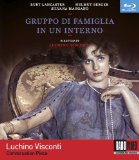| Reviews & Columns |
|
Reviews DVD TV on DVD Blu-ray 4K UHD International DVDs In Theaters Reviews by Studio Video Games Features Collector Series DVDs Easter Egg Database Interviews DVD Talk Radio Feature Articles Columns Anime Talk DVD Savant Horror DVDs The M.O.D. Squad Art House HD Talk Silent DVD
|
DVD Talk Forum |
|
|
| Resources |
|
DVD Price Search Customer Service #'s RCE Info Links |
|
Columns
|
|
|
Conversation Piece / Gruppo Di Famiglia In Un Interno
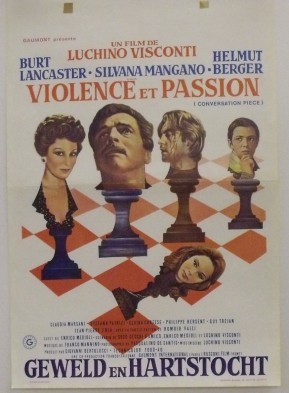
At the end of Luchino Visconti's biggest (and perhaps best) film, 1963's The Leopard, a kitten famously appears onscreen in the foreground as a final, rueful pun - a benevolent but diminished visual signifier of what the film's "leopard," the 19th-century aristocrat played by Burt Lancaster, has turned out to be after all. Lancaster returns to once more play the dignified-elder role in Visconti's penultimate effort, 1974's Conversation Piece (Gruppo di famiglia in un interno), and although it is not at all a sequel to The Leopard, it provides a kind of thematic coda; this time, Lancaster's high-minded, affluent protagonist, a refugee from all contemporary life and reality, has receded past even the harmless-kitten stage to the point of irrelevance, hiding in a privately constructed cocoon that simulates a formal, dignified world that's long gone. Conversation Piece is set in the present of 1974, so it's not possible for Lancaster to play an actual aristocrat; instead, he's a refined, retired professor whose well-maintained, quasi-aristocratic take on things - his demurring distance from all the mess, conflict, and vulgarity of modern life, public and private - are about to be intruded upon and thrown off balance in the most wonderful, awful, potentially rejuvenating but ultimately sobering and melancholy ways.
Our hermetic professor, whose self-imposed isolation in the middle of bustling Rome is an impressive if unhealthy feat, is a collector of "conversation pieces," a sort of high-toned subset of painting comprised primarily of 18th-century English works of portraiture commissioned by well-off families to depict themselves at their best. We first meet him, after the opening credits (which are preceded by a loud crash and which run over a ticker-tape readout from a heart monitor - premonitions of the film's mournful end), as he peruses a particularly alluring but overpriced piece brought to him by a group of art dealers. Sitting in on their negotiation is a nervous but imperious, fur-clad, cigarette-smoking woman (Silvana Mangano, Teorema) who, as it turns out, is a stranger that has just followed the dealers into the professor's abode because she wants an apartment in town and is scoping out the upstairs rooms that the professor intends to turn into a library, but which would actually be large enough to accommodate tenants. That's the last thing the professor wants: his surroundings are beautiful and calm, a cozy nest made up of the fine paintings, furnishings, music, and books his considerable economic means and well-developed connoisseurship have allowed him to amass. But this remarkably pushy woman (who, it turns out, is one Countess Bianca Brumonti and the wife of a top Italian industrialist) is used to getting her way, and she browbeats, cajoles, and pleads with the bewildered professor until he gives in and agrees to lease her the space.
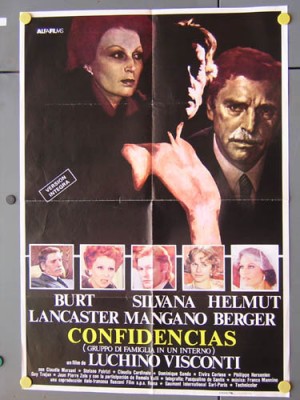
What happens to his oasis of contemplation and beauty is worse than the professor could possibly have imagined: The countess had in reality been looking for a place to keep her handsome young lover, Konrad (Helmut Berger), a somewhat seedy leftover from Europe's violent student protest movement of 1968, who has now climbed his way into the upper classes via the countess's bed. He and the countess bring their jealous, retributive, ugly bickering into the professor's home; the countess hires a wrecking crew to transform his upstairs into what could only be a stark, glaring modernist affront to his more classical eye; and Konrad and the countess's teenaged children - the guileless, adorable Lietta (Claudia Marsani) and Stefano (Stefano Patrizi), the cynical heir to his corporatist father's industrial empire - have naked, drug-fueled orgies whose pop-music soundtrack interrupts the professor's quiet nightly reading of Proust and lures him, like some demon, upstairs, away from his edifying pursuits. The half prudish, half grudgingly tolerant ambivalence with which he takes in the libertinism on display in the kids' room is only compounded by his very discreet but nevertheless clear attraction to Konrad, with whom he's bonded over the unexpectedly sensitive younger man's surprising affinity for the professor's Mozart and conversation-piece collection. When the professor finds Konrad bloodied and beaten in his quarters after a drug deal gone wrong, instead of succumbing to his anger at his tenant for bringing a criminal element into his eminently respectable home, he takes him into the apartment's anachronistic but charming secret chamber - a bedroom hidden behind a removable bookcase, to which Lietta, Stefano, and Konrad have reacted with amused glee - where he cares for the wounded victim with a tenderness that can only be described as erotic.
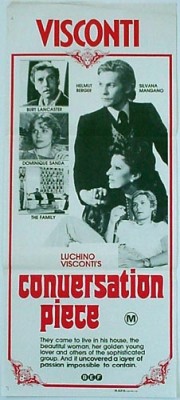
That secret chamber - a hideaway inside a hideaway - is at the film's center both literally (in the sense that it's the most inner layer of the film's tightly controlled physical space) and metaphorically: it's the repository not only of the professor's repressed romantic and sexual desires but of his nostalgia, as well, since it was where his sainted mother hid persecuted partisans and Jews during World War II. Now, at the same time that the lusty, embattled present has crashed into his life to force the hands of his stopped clock to move forward, visions from his childhood (played out in lyrical, heightened, shamelessly but aptly rapturous flashbacks with The Conformist's Dominique Sanda as his angelic, idolized mother) come and go as they please. The professor is helpless to stave off these past and present realities any longer, even letting them into the innermost part of his self-exiled retreat; his world has, for better or worse, been opened up. Despite his best efforts to resist, he finds himself involved and caring about the lives of not only the winning Lietta and the intellectually and physically attractive Konrad, but the brittle, overdramatic, wounded countess and the despairing Stefano, too; they all bring him nothing but trouble, but they bring a human connectedness, something outside of himself and his controlled environment that he can no longer deny he wants, despite his long-running and entirely conscious attempts to escape it.
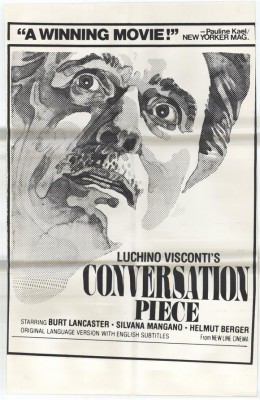
Visconti, cinematographer Pasqualino de Santis, and production designer Mario Garbuglia expertly concoct a world that both facilitates and encourages a spatial-metaphorical reading of the film, where the onscreen spaces - the secret chamber; the apartment (itself a "secret chamber" sealed off from the world); the balcony exterior that looks out and down on the surrounding world from a rarefied, lofty remove; even the open, brightly lit, crassly modern but perhaps heavenly upstairs that contrasts so starkly to the lower, red/dark tones of the professor's library/refuge - all take on a larger significance as exteriorizations of what's going on in each of the characters and what they represent to each other. The film has reflective pacing but a heightened emotional reality that's beautifully reinforced by the bold-stroke performances and by the technical and creative artistry of Visconti and his aides, who achieve the needed effects through the perfectly exaggerated, expansive spaces and unreal colors of a Sirkian melodrama and a purposely self-conscious, studio-bound artificiality that recalls Hitchcock's Rope in its brazen, striking formal audacity. Guiding us through that supremely self-contained structure is Visconti's cinematic eye, which insatiably seeks the visually striking, lavish, ornate; he has a nose for any way in which emotion can be found in or expressed through composition, color, and costume. The subjects may not be elegant (not as elegant as they think they are, at any rate) or even especially pleasant, but visually, Visconti makes them part of his own stunning "conversation piece," a lovingly rendered art object depicting a group of connected people - however fleeting their connection may be - with a personal, intimate resonance.
The definitive, probably irreconcilable contradictions that run through all of Visconti's work, contorting it into such gorgeous shapes as they pull it between a nostalgic, sensuous adoration of the past and a humane political commitment to the future, are certainly not resolved here; as usual, it's more than enough that he evokes them so powerfully and, as one might expect at this late point in his career, so assuredly. The film ends the way it inevitably must (not happily), but it has intimations of hope that are actually there in what the film expresses, not just in the exhilarating way Visconti expresses it: the professor's precise vision of what a good world would look like may not come true (and the one that exists has taken in, burnt out, and destroyed Konrad despite his opposition to it) and may die along with him. But there's still the simple kindness, spontaneity and oppenness of feeling - the natural, naive (as opposed to ideological) freedom - of Lietta to call into question any total pessimism about future generations. The film has a far-seeing, graciously tolerant, near-wistful wisdom to it that may be the exclusive provenance of those who've experienced enough life to attain it (the ailing Visconti, 66 when he made the film, would make only one more before he died in 1976). Wherever it came from, the film's poignant sagacity makes it a uniquely moving work of art, even among the long list of emotional tidal waves for which a masterful elicitor of feeling like the great Visconti can claim credit.
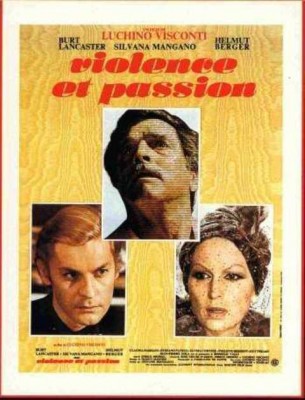
THE BLU-RAY DISC:
RaroVideo has been known to err a bit on the side of too much digital noise reduction (DNR), and Conversation Piece--presented here in an AVC/MPEG-4, 1080/24p, 2.35:1 aspect-ratio transfer--fits that pattern. It is hardly an egregious matter, however; the transfer not only looks remarkably spiffy (perhaps a little too much so), with Visconti's meticulously chosen color scheme vivid and alluring and skin tones looking as natural as Pasqualino de Santis's cinematography means them to, but it also retains enough of that all-important celluloid grain/texture to pass muster, though it could have been better. The aspect ratio controversy that has raged for some time over Criterion's Harakiri also obtains here: slight overcropping means that the aspect ratio is ever so slightly (some might say insignificantly, but it must be pointed out either way) less than the purported 2.35:1.
Sound:The DTS-HA Master Audio 2.0 soundtrack is perfect - as clear, crisp, and rich as the film's original mono soundtrack (to which this presentation does full justice) could possibly be. In Italian (post-synched by the actors as in all Italian film pre-late '70s) with optional English subtitles, and with the option of the English dubbed track/no subtitles if you happen to be some kind of masochistic purist (dubbed in English was, tragically, how it was shown in theatres upon its U.S. release).
Extras:--A 10-minute video interview with film scholar/critic Alessandro Bencivenni in which he discusses Visconti the "anomalous Marxist, strange, full of contradictions" and gives a remarkably thorough rundown of the film's sources of inspiration (including Proust and a well-known Italian art/book collector upon whom the character of the professor was partly based) in addition to offering thematic and logistical context for placing it within Visconti's filmography.
--As usual, RaroVideo includes a well-designed booklet (in addition to other pretty packaging, including the disc's cover and outer sleeve) featuring a knowledgeable critical essay by filmmaker Mark Rappaport, who, having made his own ingenious quasi-documentaries on gay subtext in cinema (Rock Hudson's Home Movies) and icons of European cinema (From the Journals of Jean Seberg) seems particularly well-suited for the task; his essay combines, as do his films, criticism and fandom in a unique proportion. (He is unfortunately, confusingly misidentified as "Mark Reynolds" on the outer packaging.)
--The film's stylish, classy original theatrical trailer.
FINAL THOUGHTS:Luchino Visconti's neglected late-career triumph - a luxuriantly insular picture that ironically derives its dramatic tension and force from the fulfillment of its elderly, dignified protagonist's well-repressed desire for a little chaos, youth, vigor, and life to make a splash in his too-still waters - may be modest compared to his groundbreaking Neorealist work (Bellissima) or his vast epics The Leopard, The Damned). Its incongruous meshing of grand artifice and single-location intimacy, however, are sweetly touching, a modest but meaningful postscript to the larger-scale films preceding it in Visconti's filmography. In depicting its protagonist's simultaneous frustrated puzzlement toward and half-grudging, half-gracious acceptance of a new world full of redefined categories and confusing, contrary, disconcertingly free young people, the old aristocrat in Visconti (appearing onscreen in the gravitas-imbued guise of Burt Lancaster's professor) is making the same generous, bittersweet gesture of letting go and deferring to the urgency of changing realities as the character Lancaster so movingly played in The Leopard. The contradictions with which Visconti's work is replete - political progressivism vs. traditional, classical beauty-venerating aesthetics; past vs. present; life vs. art - are no closer to being reconciled here than they are in any of his previous films. But they are presented with a new serenity; impending mortality, for both the professor in the film and Visconti in life, evidently allows for more perspective, even some serenity. As a beautifully realized film that's astonishingly relaxed in its mastery, Conversation Piece has the wisdom of Visconti's extensive experience; as a meditation on human relationships and the eternal struggle between conflicting ideals and desires amid changing sociopolitical tides, it has the wisdom of his years. Highly Recommended.
|
| Popular Reviews |
| Sponsored Links |
|
|
| Sponsored Links |
|
|
| Release List | Reviews | Shop | Newsletter | Forum | DVD Giveaways | Blu-Ray | Advertise |
|
Copyright 2024 DVDTalk.com All Rights Reserved. Legal Info, Privacy Policy, Terms of Use,
Manage Preferences,
Your Privacy Choices | |||||||









